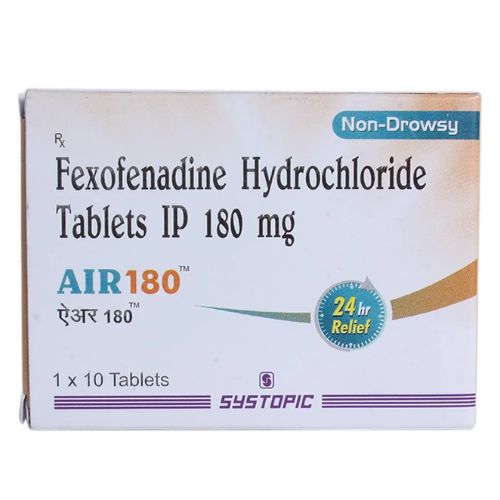Air 180 Tablet is a medication designed to provide relief from allergic symptoms, ranging from nasal congestion and runny nose to itching, swelling, and watery eyes. This anti-allergy medicine is also effective in treating skin allergies characterized by itching, redness, or swelling. In this article, we will delve into the key aspects of Air 180 Tablet, including its uses, dosage, potential side effects, and important precautions.
Uses and Benefits:
Air 180 Tablet belongs to the class of antihistamines, which work by blocking the action of histamine, a chemical released during allergic reactions. By doing so, it helps alleviate symptoms associated with allergies, providing much-needed relief to individuals suffering from various allergic conditions.
The medication is commonly prescribed for:
- Nasal Allergies: Air 180 Tablet effectively addresses symptoms such as runny nose, congestion, sneezing, and itching, providing relief from the discomfort caused by airborne allergens.
- Ocular Allergies: Watery eyes, itching, and swelling are common allergic reactions affecting the eyes. Air 180 can help manage these symptoms and improve overall eye comfort.
- Skin Allergies: It is also indicated for the treatment of skin allergies, including conditions marked by itching, redness, or swelling. The antihistaminic properties of the tablet can help alleviate these dermatological symptoms.
Dosage and Administration:
The dosage of Air 180 Tablet should be determined by a qualified healthcare professional based on individual patient factors such as age, weight, and the severity of allergic symptoms. It is typically administered orally, with or without food, as directed by the prescribing physician.
Patients are advised to adhere strictly to the recommended dosage and duration of treatment. Abruptly stopping the medication without consulting a healthcare provider is not recommended, as it may impact the effectiveness of the treatment.
Potential Side Effects:
While Air 180 Tablet is generally well-tolerated, some individuals may experience mild side effects. Common side effects include headaches, drowsiness, dizziness, and nausea. These effects are usually transient and tend to resolve with continued use. However, it is essential to inform the doctor if any side effects persist or become bothersome.
HOW TO USE AIR TABLET
Take this medicine in the dose and duration as advised by your doctor. Swallow it as a whole. Do not chew, crush or break it. Air 180 Tablet may be taken with or without food, but it is better to take it at a fixed time.
Precautions:
Certain precautions should be taken into consideration when using Air 180 Tablet:
- Consultation with a Healthcare Provider: Before starting this medication, it is crucial to consult with a healthcare professional, especially for individuals with pre-existing conditions such as kidney, liver, or heart problems.
- Pregnancy and Breastfeeding: Pregnant or breastfeeding individuals should seek medical advice before using Air 180 Tablet, as the safety of the medication during these periods needs to be carefully evaluated.
- Avoid Self-Medication: Patients should refrain from self-medicating and should not recommend the medicine to others, even if symptoms appear similar. Every individual's medical condition is unique, and a healthcare professional's guidance is crucial for effective and safe treatment.
Conclusion:
Air 180 Tablet stands as a valuable option in the management of allergic symptoms, providing relief to those affected by nasal, ocular, and skin allergies. As with any medication, it is essential to follow the prescribed guidelines, report any adverse effects promptly, and consult with a healthcare provider for personalized advice. By understanding the uses, dosage, potential side effects, and precautions associated with Air 180 Tablet, individuals can make informed decisions about their allergy treatment with the guidance of a qualified medical professional.
For more information visit : https://medixic.com/buy/air-180-tablet-16217/





Comments